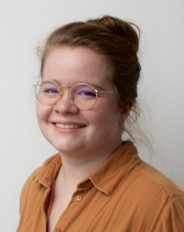Mathilde Franckel
Interview by Carey Sargent, EPFL, NCCR MARVEL
Have you always been interested in science?
I think so, in France you needed to choose if you wanted to do science at the level of the baccalaureate. However, I had always been a curious child and my parents encouraged me to ask myself questions so very logically, this brought me to a scientific field. I then slowly began to specialize into something that was particularly interesting to me.
How did you hear about the INSPIRE Potentials Program?
I know Professor Véronique Michaud at EPFL. We discussed my interest in academia, but that I knew that it was a leap between a French engineering school and a large research institute like EPFL. I was asking her questions about what she would recommend and she said my profile would exactly match the INSPIRE program and that I should look into it. That’s how I decided to apply.

What is the topic of your master’s project?
Basically, we are working on the optical transitions in magnesium oxide and calcium oxide linked to an oxygen vacancy. In metal oxides, this space can be filled by up to two electrons. There are several interesting optical transitions when these electrons are released to other levels, which we are currently investigating. We are trying to compare the experimental data and what has previously been done to have a very clear overview of what is happening. There is also a scheme for finite size correction that was developed in the group with Stefano Falletta, a current PhD with Prof. Alfredo Pasquarello. It’s an interesting project for me to collaborate with him on and also to see how this scheme could possibly work in other projects.
Do women face specific challenges in the sciences?
For sure, especially when I was working in a company because they need specific profiles. In academia, being a little bit eccentric or out of the norm is not as important as long as you are doing good job. I did feel more pressure in high school where there were expectations around what girls were supposed to do. For me, I think the french “concours” system gave me confidence in my capabilities because no one knew who I was, my name, my face or my gender when I was recruited.
But I definitely think that there are issues, otherwise we would simply have 50-50 representation in the labs. We can be polite about it as much as we want but the reality is that there are still very few women in the corridors of the physics departments in general.
That being said, I try not to let bad experiences impact me and I try to grow from the good experiences I’ve had in my life.
Any advice for young girls interested in the field?
I would say that they shouldn’t ask themselves too many questions about what other people think. Ask yourself questions about what you like and don’t be scared of talking too much or being ambitious. Oftentimes, women face challenges because subconsciously they make some people uncomfortable, you may not correspond to the mental image they have of a scientist. Regardless, that’s not your problem and you will meet other incredibly supportive people, try to build your experience off them and ignore the rest.
Play it smart and capitalize on your assets. You will eventually reach a point where you are surounded by people that respect what you do. As long as you’re happy and enjoy your field, the rest doesn’t matter. That being said, I’m aware that it’s easier said than done.
What are your plans for the future?
I plan to continue on to do a PhD and I’m currently exploring my options. Right now, what I’m doing is very much theoretical physics and as much as I enjoy it, I think I would benefit from collaborations with the experimental field and from including the knowledge I acquired previously in machine learning and data science.
